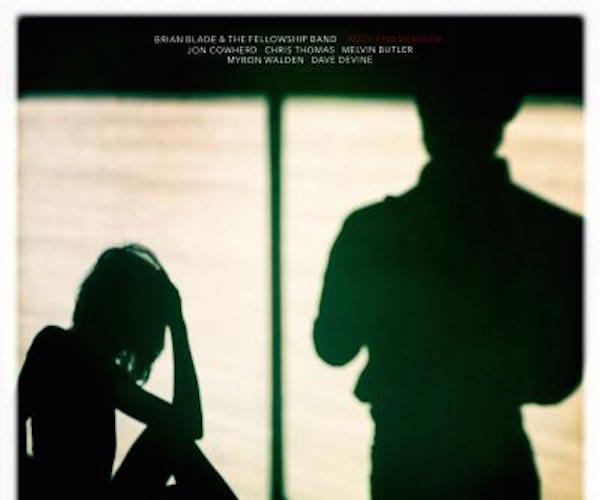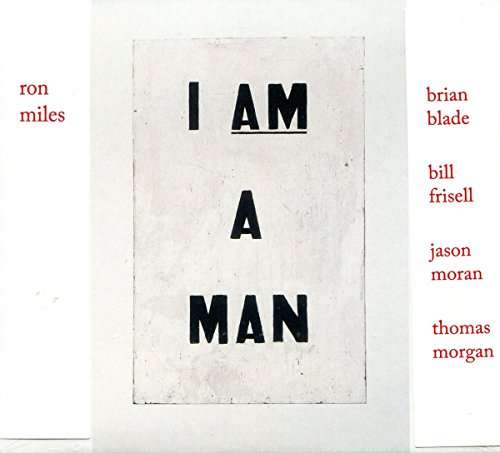Jazz CD Reviews: “Body and Shadow” and “I Am A Man”
Brian Blade is not only skillfully discreet: he can be as powerful as any drummer since Elvin Jones.
Body and Shadow, Brian Blade and the Fellowship Band (Blue Note)
I Am A Man, Ron Miles (Enja/yellowbird Records)

Album Cover for “Body and Shadow,” Brian Blade Fellowship
By Michael Ullman
What ties these two sessions together is the presence of the precise, inspiringly tactful drumming of Brian Blade, whose Fellowship Band first appeared in The Brian Blade Fellowship, a session released in 1998. Blade can be more than discreet: he can be as powerful as any drummer since Elvin Jones. His head bobbing, shoulders rotating, his back as flexible as a snake, he plays drums with his whole body. His hands seem to flash round and about. At his most intense moments, he rises from his seat and hovers over the drums as if he is admonishing them, disappointed that they didn’t give him more. Still, he always sounds relaxed and musical, his sticks light, his beat supple. To this listener, the most apposite historical antecedent would be the snap, crackle, and pop of Roy Haynes’s drumming.
Still in his forties, Blade has recorded widely and with the best. He is a member of Wayne Shorter’s quartet (listen to Without a Net ); he was on Chick Corea’s Grammy-winning album Trilogy and has recorded with Herbie Hancock as well as with Josh Redman, Helen Sung, David Binney, Danilo Perez, Billy Childs, Jenny Scheinman, and scores of others. He was the first drummer in the SF Jazz Collective, and performed on Charlie Haden’s American Dreams and Chris Potter’s Gratitude. He’s also recorded repeatedly with Kenny Garrett. Vocalists love him, and not just jazz musicians: he was the drummer on Norah Jones’s most successful records, including Come Away With Me. He has also drummed on recordings by Joni Mitchell, Emmylou Harris, and Bob Dylan.
Born in Louisiana, Blade grew up with gospel music. He recalls that he was fired from an early gig because he would not adapt his style to fit in with the other players. He learned that lesson; he’s an eclectic listener and in the course of his career has proved to be open to all kinds of sounds. He can also be generous when it comes to serving his musical vision. For example, at the center of his new disc Body and Shadow, with its pun on “Body and Soul,” there are two versions of the beautifully serene hymn “Have Thine Own Way, Lord,” written in 1907 by Adelaide Pollard. “Have thine own way, Lord! Have Thine own way!”, the lyrics go. “Thou art the Potter, I am the clay.” (The text is based on a passage in Isaiah, where the Old Testament prophet marvels on how God “acts for those who wait for him.” Of course, waiting, being still, is a key skill for a musician.) This hymn is an important part of the album, but it is kicked in its first appearance by a harmonium solo from Fellowship keyboard player Jon Cowherd. Blade is nowhere to be heard. The drummer only enters during the ensemble version, and then he strikes a modest pose. The melody is played, in unison, first by saxophonists Melvin Butler and Myron Walden (on clarinet here) and then pianist Cowherd. If there were such a thing, I’d call it a March in ¾. No one improvises with much determination, yet it pays to listen to Blade’s quietly affecting drumming, even on this straightforward approach to a simple tune. He imitates the melody of the song, but then adds chattering figures on the snare, arriving at the perfect ending: a gentle, slowly spreading splash on the cymbal.
“Body and Shadow” is based on two alternating chords, which are repeated like the ticking of a clock. If one could imagine a timepiece that sounded so wistful. Written by Blade, the piece is played three times in different versions: “Noon,” “Morning,” and “Night.” Bell-like sounds mark the sparkling “Morning,” the dawning hours envisioned as dreamy and subdued. On “Night,” the opening is delivered on bass clarinet and then taken up by Dave Devine’s guitar and Chris Thomas’ bass. The more conventionally swinging piece “Duality becomes between “Morning” and “Night;”here Blade allows himself to act out a bit.
Blade has had a long musical relationship with the eclectic guitarist Bill Frisell, going back to the 2002 album Come Away With Me. Cornetist Ron Miles has been on half a dozen sessions led by Frisell. More importantly, Blade and Frisell make up two-thirds of the Ron Miles trio, which is featured on 2012’s Quiver and 2014’s Circuit Rider albums. Besides their glorious musicality, what these three performers share is an appetite for a wide-ranging repertoire and a penchant for applying an at times glowing lyricism to unlikely tunes. On his 2002 album Heaven, Miles performs on Hank Williams’ “Your Cheating Heart” and Dylan’s “A Hard Rain’s A-Gonna Fall,” as well as Jelly Roll Morton’s “King Porter Stomp.” For Quiver, with Frisell and Blade, Miles resurrects the wry twenties hit “There Ain’t No Sweet Man Worth the Salt of My Tears.” (Cornetist Bix Beiderbecke recorded a jaunty version of this tune with Paul Whiteman’s Orchestra in 1929, Bing Crosby on vocals. Beiderbecke, who rips into a short solo on “Salt of My Tears,” may have inspired Miles’ decision to play the cornet rather than the trumpet.) Frisell plays country; Blade plays everything. These three are well suited to each other.

In I Am A Man, Miles has added pianist Jason Moran and young star bassist Thomas Morgan to the mix. The title suggests there’s a political sub-text to the music, though the title piece starts off playfully, with Morgan and Frisell providing a series of delicate comments, seemingly addressing each other, before Moran enters. Then Miles comes in, drawing on his broad, almost vibrato-less tone. There’s a kind of sobriety to Miles’s sound: everything seems earnest and bracingly intentional. Yet there are flickers of mellow humor and grace. A few moments during the tune “I Am A Man,” after playing broad tones, Miles suddenly breaks up the beat with increasingly staccato phrases, generating a stuttering sound. Moran answers him with a equally disjointed set of responses while Blade chatters tensely underneath the two of them.
Miles’s “Darken My Door” begins (again) conversationally, but this time Moran is on top, playing a reserved set of introductory choruses over Morgan’s bass and Blade’s cymbals. The pianist becomes increasingly extroverted, rushing through a series of scalar passages before striking some grandiose tremolos, finally settling down into a genially swinging beat. At this point, more than four minutes into the number, Miles enters with the tune’s lovely melody. Humor abounds in this album; there is a song entitled “Is there room in your heart for a man like me?” while Miles wants us to be part of his “Revolutionary Congregation.” A wonderful disc from a collection of smashing and/or sensitive players — thoughtful, delicate, propulsive, and intense.
Michael Ullman studied classical clarinet and was educated at Harvard, the University of Chicago, and the U. of Michigan, from which he received a PhD in English. The author or co-author of two books on jazz, he has written on jazz and classical music for The Atlantic Monthly, The New Republic, High Fidelity, Stereophile, The Boston Phoenix, The Boston Globe, and other venues. His articles on Dickens, Joyce, Kipling, and others have appeared in academic journals. For over 20 years, he has written a bi-monthly jazz column for Fanfare Magazine, for which he also reviews classical music. At Tufts University, he teaches mostly modernist writers in the English Department and jazz and blues history in the Music Department. He plays piano badly.
Tagged: "Body and Shadow", Brian Blade, Brian Blade and the Fellowship Band, I Am a Man
